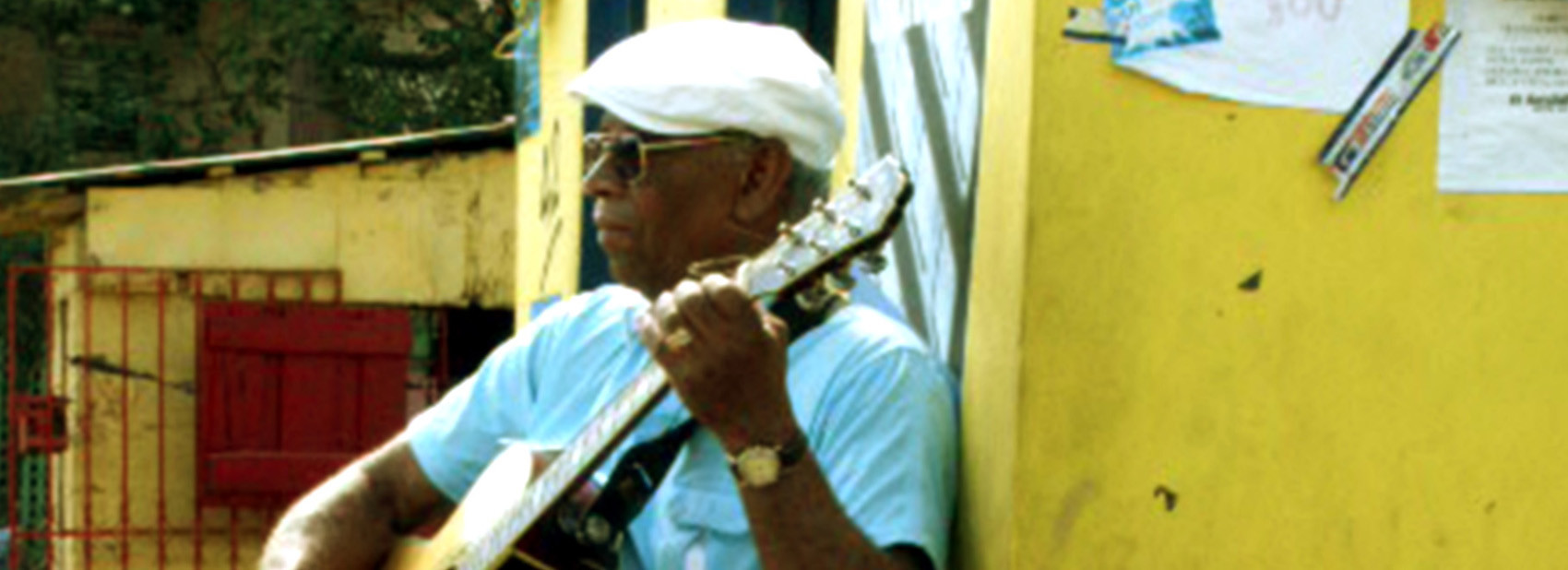
"World Music this is not - but a magic bullet for the heart and the mind. There's no one quite like Puerto Plata out there. I can't get his music out of my head" - Junot Díaz
"The rhythms are taut and frisky, topped with spiky, stuttering leads from the requinto that sends its countermelodies dancing merrily around Puerto Plata’s memories and advice." - Jon Pareles, New York Times
Born in the resort town of Puerto Plata in 1923, Jose Cobles combines the wisdom of an elder statesman with an astounding vigor and charisma which one would expect of a much younger man. His three uncles were musicians and he recalls Sundays spent at their house in the presence of such legends of Dominican music as composer Juan Lockward and singer Eduardo Brito. His mother died when he was young, and upon the death of his grandmother when he was 16 he went to work as a carpenter for the United Fruit Company. His work took him to Manzanillo, to Panama, and finally led him to settle in Santiago (in the Dominican Republic) at the age of 27. There, because of his hometown, he was christened with the nickname “Puerto Plata”. It was when he was living in Manzanillo that he began to save pennies in a shoe box until he was able to buy his first guitar for 20 Dominican pesos. He was 24 years old — leaving him a scant 62 years of practice to bring his mastery to its current level!
The barrio of La Joya, where Puerto Plata settled, is Santiago’s most storied neighborhood, and its most feared. Here, in the brothels lining the square around the slaughterhouse, or matadero, in the barrio’s center, lived the famous “macheteros” of the era: Negro and Chichí Macusín; their rival, blonde haired and blue eyed Memé; La Guineita and his brother Macduffy. But the brothels also brought musicians to La Joya, and the barrio has always been the center of popular culture in Santiago. Eduardo Brito had a mistress there whom he frequently visited, and Bienvenido Troncoso, the most famous Dominican guitarist of his era, was a “Joyero” born and raised. At carnival time, the only barrio which could compete with the costumes and music of La Joya was its deadly rival, Los Pepines.
It was in this highly charged musical environment that Puerto Plata met his lifelong artistic collaborator, the singer Daniel Rodriguez. Daniel was already well known in the city as the shortstop for Las Aguilas Cibaeñas, Santiago’s professional baseball team, as well as for the Dominican national team. Daniel and Puerto Plata formed the Trio Primavera with “Sanabia”, Ernesto Almonte, a talented lead guitarist from a well-known musical family. With Daniel’s recent death, Puerto Plata has become the group’s only surviving member. He recalls playing four or five serenades a night on weekends in Santiago, and performing son and bolero regularly for many years at “El Arbolito”, a cabaret across the street from the matadero.
From 1931 until 1961, the musical climate in the Dominican Republic was stifled by the Trujillo dictatorship, and pre-bachata guitar musicians like Puerto Plata were rarely heard or seen outside of the country side, no matter how great their popularity. By the time Trujillo was shot, in 1961, and José Manuel Calderón recorded the first bachata, Dominican son had become relegated to the streets and patios of Santiago, San Pedro and Santo Domingo. While bachata and guitar merengue has in recent years broken the stigma laid on Dominican guitar music, Dominican son, with the notable exception of Cuco and Martin Valoy’s group, Los Ahijados, has remained an informal music – rarely recorded or commercialized.
In 2007, at age 84, Puerto Plata launched his critically acclaimed debut, “Mujer de Cabaret.” The album takes you back to the golden age of Dominican guitar music. Its sones, boleros and merengues are a testament to a time gone but not forgotten, of serenades, carousing and revelry. Puerto Plata’s sweet, nostalgic voice is accompanied on the requinto by two of the Dominican Republic’s finest guitar virtuosos, Edilio Paredes and Frank Mendez.
On September 1, 2009 Puerto Plata's released his second album, "Casita de Campo," a glorious selection of classic love songs and lilting dance numbers composed during the brutal, repressive regime of the dictator Rafael Trujillo (1930-1960).
Since his 2007 debut release, Puerto Plata has toured throughout the USA and Europe. He currently resides in Denver Colorado, close to his family and grandchildren.
My Grandfather, Domingo Acevedo, known as "Machin" was a guitar player during la epoca de oro. I have been trying to get a hold of his recordings or to speak to anyone that might remeber him. If anyone reads this comment and knows anyting about him. Please respond.
Como puedo contactarme con el sr jose cobles favor de escribirme con el numero de el
I love him!!!!
puerto plata es uno de los mejores soneros de santiago ,y iaso deberia aser las tablaturas y acordes de sus canciones
Exelent
Add new comment